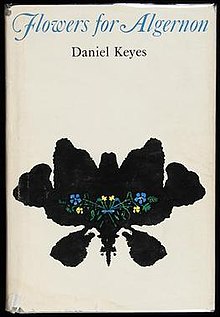Flowers for Algernon

First edition cover
|
|
| Author | Daniel Keyes |
|---|---|
| Country | United States |
| Language | English |
| Genre | Science fiction |
| Publisher | Harcourt, Brace & World |
|
Publication date
|
April 1959 (short story) March 1966 (novel) |
| Media type | Print (hardback & paperback) |
| Pages | 311 (novel) |
| ISBN | |
| OCLC | 232370 |
Flowers for Algernon is a science fiction short story and subsequent novel written by Daniel Keyes. The short story, written in 1958 and first published in the April 1959 issue of The Magazine of Fantasy & Science Fiction, won the Hugo Award for Best Short Story in 1960. The novel was published in 1966 and was joint winner of that year's Nebula Award for Best Novel (with Babel-17).
The eponymous Algernon is a laboratory mouse who has undergone surgery to increase his intelligence by artificial means. The story is told by a series of progress reports written by Charlie Gordon, the first human test subject for the surgery, and it touches upon many different ethical and moral themes such as the treatment of the mentally disabled.
Although the book has often been challenged for removal from libraries in the US and Canada, sometimes successfully, it is frequently taught in schools around the world and has been adapted many times for television, theatre, radio, and as the Academy Award-winning film Charly.
The ideas for Flowers for Algernon developed over 14 years and were inspired by events in Keyes's life, starting in 1945 with Keyes's conflict with his parents who were pushing him through a pre-medical education despite his desire to pursue a writing career. Keyes felt that his education was driving a wedge between him and his parents, and this led him to wonder what would happen if it were possible to increase a person's intelligence.
A pivotal moment occurred in 1957 while Keyes was teaching English to students with special needs; one of them asked him if it would be possible to be put into a regular class if he worked hard and became smart. Keyes also witnessed the dramatic change in another learning-disabled student who regressed after he was removed from regular lessons. Keyes said that "When he came back to school, he had lost it all. He could not read. He reverted to what he had been. It was a heart-breaker."
...
Wikipedia
